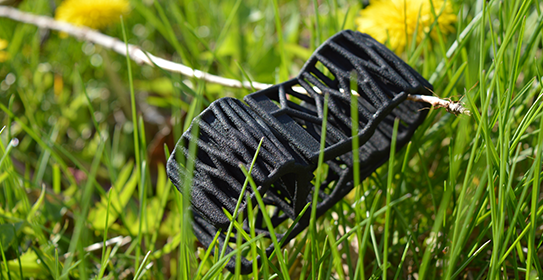World Environment Day is June 5th, 2021, and we’re celebrating the positive impact the additive manufacturing industry and ProtoCAM are contributing to our environment and world sustainability. World Environment Day has a focus on preserving natural processes, emerging green technologies, and innovative thinking that can help restore the world’s ecosystems, rather than just mitigation or adaptation.
While there is much one can do on an individual level to reduce their carbon footprint and better sustain our planet, focus has increasingly shifted towards encouraging corporations to take accountability for their significant environmental impact. As corporations produce just about everything we buy, use, and throw away, they play an incredible role in driving global climate change. A 2017 report identified that 100 energy companies have been responsible for 71% of all industrial emissions since human-driven climate change was officially recognized.
At ProtoCAM, we take this seriously, and have subsequently incorporated an environmental initiatives program within our facility. Some of these initiatives include exercising responsible disposal of materials, using sustainable packing materials, and recycling as much as possible. We also strive to teach students about STEM programs and environmental sustainability to help influence upcoming generations to care for the Earth. Additionally, ProtoCAM regularly researches and gathers new ideas for how to better facilitate green initiatives within our company, both on a smaller-scale basis in everyday office decisions, and within larger-scale facility-wide actions.
This month, we’re focused on the principal of See It, Own It, Solve It, Do It. This is a principal of accountability that we’ve applied to environmental awareness and sustainability both within and outside our facility. The general idea is to not ignore the problems in the world and around our own facility (whether its as small as a piece of litter on the ground, or as large as the contributions of global meat consumption to greenhouse gases) but to really see them, take the problems upon oneself, consider ways to solve the problem, and then solve that problem by doing something about it. We’re sharing this principal within our facility among our staff, with an aim to better equip our entire staff to be better stewards of the environment in their everyday life, as well as better agents of accountability in general.
Industry-wide, while additive manufacturing intrinsically utilizes plastic, a major contributor to global pollution, it is inherently a greener production process than other processes, and we’re constantly working to make it even better. ProtoCAM uses additive manufacturing technologies such as Stereolithography (SLA), Multi Jet Fusion (MJF), and Digital Light Synthesis (DLS), which all create products by adding or building on material to create the shape of the final part. By contrast, subtractive manufacturing uses a large piece of metal, plastic, or other substance and shapes it by removing or cutting away some of the material.
The percentage of waste product is incredibly minimal with additive manufacturing, as the processes use only what material is necessary to complete the final shape. Our MJF technology takes this a step further by recycling used but unfused powder back through the system. Waste can be further reduced within the additive manufacturing process by utilizing Design for Additive Manufacturing (DFAM) techniques like topology optimization, which involves designing based on various stress points to reduce the amount of material used, which simultaneously increases the speed of production, reduces material costs, and reduces weight of the final part.
The unique nature of additive manufacturing has also encouraged many other companies all around the world to introduce environmental initiatives into their facilities via additive manufacturing. In Australia and China, scientists based at the Swinburne University of Technology and Hebei University of Technology have managed to turn construction waste into a sustainable new 3D printing material, while company Covestro has created a 3D printing material made from 100% post-consumer plastic waste with excellent structural performance and a lower carbon footprint than virgin material. Multinational car manufacturer Groupe Renault is creating an ‘Re-Factory’ that’s dedicated entirely to sustainable automotive production, which includes offering a 3D-printed spare parts service, while a Horizon 2020 project called BARBARA (Biopolymers with Advanced functionalities foR Building and Automotive parts processed through Additive Manufacturing) has brought together 11 partners from across Europe to produce bio-based materials from food waste suitable for 3D printing prototypes in the automotive and construction sectors. These are just a few of the environmental initiatives being introduced using additive manufacturing with the ultimate goal of developing a closed-loop manufacturing process that reuses and repurposes all waste materials.
It is up to each and every one of us to help restore our Earth, not just because we care about the natural world, but because we live here. A healthy Earth allows us to work and function here at ProtoCAM, and is key to our survival as a species and continued health and happiness. At ProtoCAM, a healthy planet is not an option, it is a necessity, and we will continue to work towards improving the health of our Earth.
Want to check out our See It, Own It, Solve It, Do It. handout for this month? Click below!

